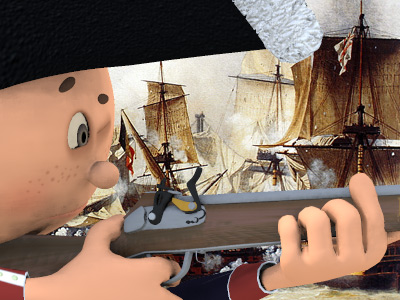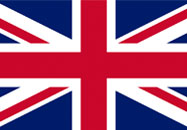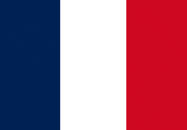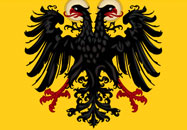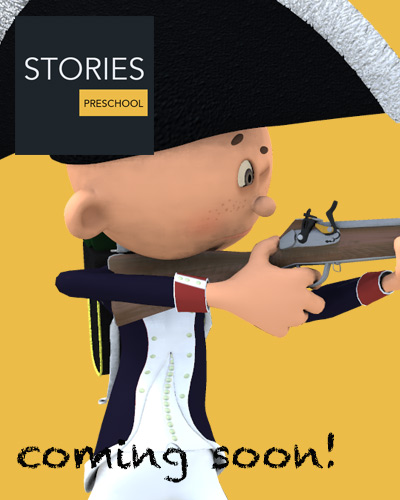Napoleonic Wars (1803-1815)
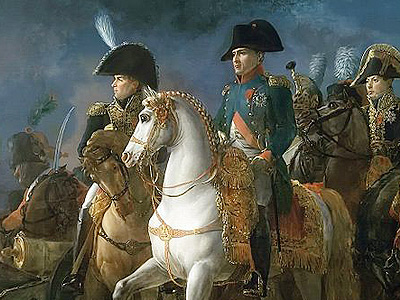
War between Britain and France 1803–1814
British Motivations
Britain ended the uneasy truce created by the Treaty of Amiens when it declared war on France in May 1803. The British were increasingly angered by Napoleon's reordering of the international system in Western Europe, especially in Switzerland, Germany, Italy and the Netherlands. Kagan argues that Britain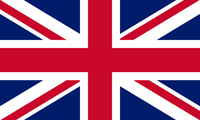 The United Kingdom of Great Britain and Ireland was a sovereign state in Northwestern Europe that comprised the entirety of the British Isles between 1801 and 1922. The United Kingdom, having financed the European coalition that defeated France during the Napoleonic Wars, developed a large Royal Navy that enabled the British Empire to become the foremost world power for the next century. was especially alarmed by Napoleon's assertion of control over Switzerland. Britons felt insulted when Napoleon
The United Kingdom of Great Britain and Ireland was a sovereign state in Northwestern Europe that comprised the entirety of the British Isles between 1801 and 1922. The United Kingdom, having financed the European coalition that defeated France during the Napoleonic Wars, developed a large Royal Navy that enabled the British Empire to become the foremost world power for the next century. was especially alarmed by Napoleon's assertion of control over Switzerland. Britons felt insulted when Napoleon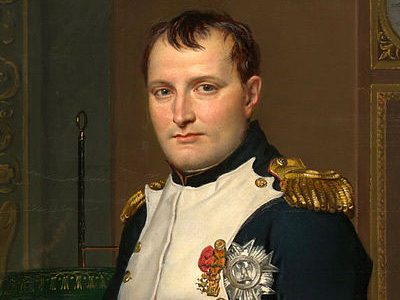 Napoleon Bonaparte (1769-1821), was a French military and political leader who rose to prominence during the French Revolution and led several successful campaigns during the French Revolutionary Wars. As Napoleon I, he was Emperor of the French from 1804 until 1814, and again in 1815. One of the greatest commanders in history, his wars and campaigns are studied at military schools worldwide. Napoleon Bonaparte » said it deserved no voice in European affairs (even though King George was an elector of the Holy Roman Empire
Napoleon Bonaparte (1769-1821), was a French military and political leader who rose to prominence during the French Revolution and led several successful campaigns during the French Revolutionary Wars. As Napoleon I, he was Emperor of the French from 1804 until 1814, and again in 1815. One of the greatest commanders in history, his wars and campaigns are studied at military schools worldwide. Napoleon Bonaparte » said it deserved no voice in European affairs (even though King George was an elector of the Holy Roman Empire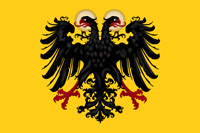 The Holy Roman Empire was a political entity in Western, Central, and Southern Europe that developed during the Early Middle Ages and continued until its dissolution in 1806 during the Napoleonic Wars. From the accession of Otto I in 962 until the twelfth century, the Empire was the most powerful monarchy in Europe. The empire reached the apex of territorial expansion and power in the mid-thirteenth century, but overextending led to partial collapse.), and sought to restrict the London newspapers that were vilifying him.
The Holy Roman Empire was a political entity in Western, Central, and Southern Europe that developed during the Early Middle Ages and continued until its dissolution in 1806 during the Napoleonic Wars. From the accession of Otto I in 962 until the twelfth century, the Empire was the most powerful monarchy in Europe. The empire reached the apex of territorial expansion and power in the mid-thirteenth century, but overextending led to partial collapse.), and sought to restrict the London newspapers that were vilifying him.
Britain had a sense of loss of control, as well as loss of markets, and was worried by Napoleon's possible threat to its overseas colonies. McLynn argues that Britain went to war in 1803 out of a "mixture of economic motives and national neuroses – an irrational anxiety about Napoleon's motives and intentions." McLynn concludes that in the long run it proved to be the right choice for Britain, because in the long run Napoleon's intentions were hostile to the British national interest. Napoleon was not ready for war and so this was the best time for Britain to stop them. Britain seized upon the Malta issue, refusing to follow the terms of the Treaty of Amiens and evacuate the island.

Battle of San Domingo, 6 February 1806

Battle of San Domingo, 6 February 1806
( Click image to enlarge)
The deeper British grievance was their perception that Napoleon was taking personal control of Europe, making the international system unstable, and forcing Britain to the sidelines.
Numerous scholars have argued that Napoleon's aggressive posture made him enemies and cost him potential allies. As late as 1808, the continental powers affirmed most of his gains and titles, but the continuing conflict with Britain led him to start the Peninsular War and the invasion of Russia Russian Empire was an empire and the final period of the Russian monarchy from 1721 to 1917, ruling across large parts of Eurasia. The rise of the Russian Empire coincided with the decline of neighbouring rival powers: the Swedish Empire, the Polish–Lithuanian Commonwealth, Qajar Iran, the Ottoman Empire, and Qing China. Russia remains the third-largest empire in history, surpassed only by the British Empire and the Mongol Empire. which many scholars see as a dramatic miscalculation.
Russian Empire was an empire and the final period of the Russian monarchy from 1721 to 1917, ruling across large parts of Eurasia. The rise of the Russian Empire coincided with the decline of neighbouring rival powers: the Swedish Empire, the Polish–Lithuanian Commonwealth, Qajar Iran, the Ottoman Empire, and Qing China. Russia remains the third-largest empire in history, surpassed only by the British Empire and the Mongol Empire. which many scholars see as a dramatic miscalculation.
There was one serious attempt to negotiate peace with France France, officially the French Republic is transcontinental country predominantly located in Western Europe and spanning overseas regions and territories in the Americas and the Atlantic, Pacific and Indian Oceans. France reached its political and military zenith in the early 19th century under Napoleon Bonaparte, subjugating much of continental Europe and establishing the First French Empire. during the war, made by Charles James Fox in 1806. The British wanted to retain their overseas conquests and have Hanover restored to George III in exchange for accepting French conquests on the continent. The French were willing to cede Malta, Cape Colony, Tobago, and French Indian posts to Britain but wanted to obtain Sicily in exchange for the restoration of Hanover, a condition the British refused.
France, officially the French Republic is transcontinental country predominantly located in Western Europe and spanning overseas regions and territories in the Americas and the Atlantic, Pacific and Indian Oceans. France reached its political and military zenith in the early 19th century under Napoleon Bonaparte, subjugating much of continental Europe and establishing the First French Empire. during the war, made by Charles James Fox in 1806. The British wanted to retain their overseas conquests and have Hanover restored to George III in exchange for accepting French conquests on the continent. The French were willing to cede Malta, Cape Colony, Tobago, and French Indian posts to Britain but wanted to obtain Sicily in exchange for the restoration of Hanover, a condition the British refused.
Unlike its many coalition partners, Britain remained at war throughout the period of the Napoleonic Wars. Protected by naval supremacy (in the words of Admiral Jervis to the House of Lords "I do not say, my Lords, that the French will not come. I say only they will not come by sea"), Britain maintained low-intensity land warfare on a global scale for over a decade. The British government paid out large sums of money to other European states, so that they could pay armies in the field against France. These payments are colloquially known as the Golden Cavalry of St George. The British Army provided long-term support to the Spanish rebellion in the Peninsular War of 1808–1814, assisted by Spanish guerrilla ('little war') tactics. Anglo-Portuguese forces under Arthur Wellesley supported the Spanish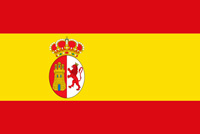 Spain or the Kingdom of Spain, is a country primarily located in southwestern Europe with parts of territory in the Atlantic Ocean and across the Mediterranean Sea. A major country of the Age of Discovery, Spain began the colonization of the New World in 1492 developing one of the largest empires in history and underpinned the emergence of a global trading system primarily fuelled by precious metals., which campaigned successfully against the French armies, eventually driving them from Spain and allowing Britain to invade southern France. By 1815, the British Army played the central role in the final defeat of Napoleon at Waterloo.
Spain or the Kingdom of Spain, is a country primarily located in southwestern Europe with parts of territory in the Atlantic Ocean and across the Mediterranean Sea. A major country of the Age of Discovery, Spain began the colonization of the New World in 1492 developing one of the largest empires in history and underpinned the emergence of a global trading system primarily fuelled by precious metals., which campaigned successfully against the French armies, eventually driving them from Spain and allowing Britain to invade southern France. By 1815, the British Army played the central role in the final defeat of Napoleon at Waterloo.
Beyond minor naval actions against British imperial interests, the Napoleonic Wars were much less global in scope than preceding conflicts such as the Seven Years' War, which historians term a "world war".

Battle of the Pyrenees, July 1813

Battle of the Pyrenees, July 1813
( Click image to enlarge)
Economic Warfare
In response to the naval blockade of the French coasts enacted by the British government on 16 May 1806, Napoleon issued the Berlin Decree on 21 November 1806, which brought into effect the Continental System. This policy aimed to eliminate the threat from Britain by closing French-controlled territory to its trade. Britain maintained a standing army of 220,000 at the height of the Napoleonic Wars, of whom less than half were available for campaigning. The rest were necessary for garrisoning Ireland and the colonies, and providing security for Britain. France's strength peaked at around 2,500,000 full-time and part-time soldiers including several hundred thousand National Guardsmen who Napoleon could draft into the military if necessary. Both nations enlisted large numbers of sedentary militia who were unsuited for campaigning, and were mostly employed to release regular forces for active duty. The Royal Navy disrupted France's extra-continental trade by seizing and threatening French shipping and colonial possessions, but could do nothing about France's trade with the major continental economies and posed little threat to French territory in Europe. France's population and agricultural capacity far outstripped that of Britain. Britain had the greatest industrial capacity in Europe, and its mastery of the seas allowed it to build up considerable economic strength through trade. This ensured that France could never consolidate its control over Europe in peace. Many in the French government believed that cutting Britain off from the Continent would end its economic influence over Europe and isolate it.
Financing the War
A key element in British success was its ability to mobilise the nation's industrial and financial resources and apply them to defeating France. With a population of 16 million against France's 30 million, the French numerical advantage was offset by British subsidies that paid for many of the Austrian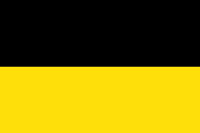 Austrian Empire was a Central-Eastern European and multinational great power from 1804 to 1867, created by proclamation out of the realms of the Habsburgs. During its existence, it was the third most populous monarchy in Europe after the Russian Empire and the United Kingdom. Along with Prussia, it was one of the two major powers of the German Confederation. The empire was proclaimed by Francis II in 1804 in response to Napoleon's declaration of the First French Empire. and Russian soldiers, peaking at about 450,000 men in 1813. Under the Anglo-Russian agreement of 1803, Britain paid a subsidy of £1.5 million for every 100,000 Russian soldiers in the field.
Austrian Empire was a Central-Eastern European and multinational great power from 1804 to 1867, created by proclamation out of the realms of the Habsburgs. During its existence, it was the third most populous monarchy in Europe after the Russian Empire and the United Kingdom. Along with Prussia, it was one of the two major powers of the German Confederation. The empire was proclaimed by Francis II in 1804 in response to Napoleon's declaration of the First French Empire. and Russian soldiers, peaking at about 450,000 men in 1813. Under the Anglo-Russian agreement of 1803, Britain paid a subsidy of £1.5 million for every 100,000 Russian soldiers in the field.
British national output remained strong, and the well-organised business sector channeled products into what the military needed. Britain used its economic power to expand the Royal Navy, doubling the number of frigates, adding 50% more large ships of the line, and increasing the number of sailors from 15,000 to 133,000 in eight years after the war began in 1793. France saw its navy shrink by more than half. The smuggling of finished products into the continent undermined French efforts to ruin the British economy by cutting off markets. Subsidies to Russia and Austria kept them in the war. The British budget in 1814 reached £66 million, including £10 million for the Royal Navy, £40 million for the army, £10 million for the allies, and £38 million as interest on the national debt, which soared to £679 million, more than double the GDP. It was supported by hundreds of thousands of investors and taxpayers, despite the higher taxes on land and a new income tax. The cost of the war came to £831 million. In contrast, the French financial system was inadequate and Napoleon's forces had to rely in part on requisitions from conquered lands.
HISTORY
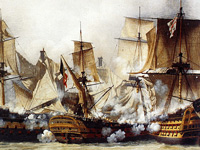
RESOURCES
This article uses material from the Wikipedia article "Napoleonic Wars", which is released under the Creative Commons Attribution-Share-Alike License 3.0.
© Stories Preschool. All Rights Reserved.
